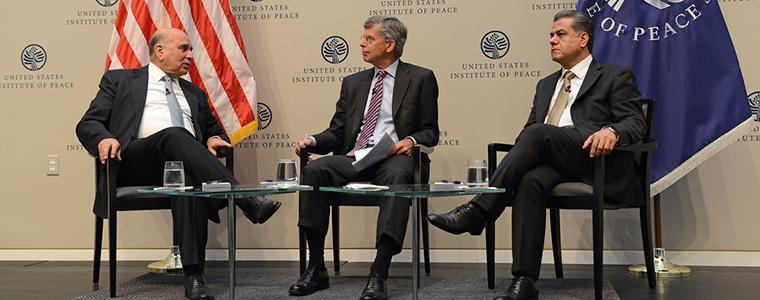Iraq Turmoil: What is Next after Government Formation?
A Conversation with Kurdish Leaders Dr. Fuad Hussein and Minister Falah Mustafa Bakir
Read the Event CoverageOn September 18, 2014, the U.S. Institute of Peace hosted two distinguished Kurdish leaders for a discussion about the next steps in Iraq’s political process, how to confront the ISIL and what role the United States and other regional and international actors might play.

International attention on Iraq has heightened since the Islamic State of Iraq and the Levant (ISIL or ISIS, under an alternative acronym) terrorist group seized control of large parts of northern and western Iraq, establishing a caliphate, displacing some 1.7 million people and brutally killing hundreds more.
U.S. airstrikes enabled the Kurdish Peshmerga and Iraqi Forces to push back on the ISIL and regain some of the areas lost to the militant group over the past few months. But further support from the U.S. is contingent upon the establishment of an inclusive Iraqi government to take the lead in countering the terrorist group and addressing underlying political, security, economic and social dynamics that allowed for ISIL advances.
Under significant internal and external pressure, Iraqi leaders have formed a new government that includes Shia, Sunnis and Kurds. While a new government and recent successes against ISIL are welcome developments, key challenges lie ahead, and questions about sustaining progress remain. In particular, the Kurds have given Prime Minister Haider al-Abadi three months to meet their demands on the national budget, oil and gas issues, and disputed territories. The Kurdistan Region and the rest of Iraq also are struggling with high levels of internal displacement, which have brought tremendous human suffering, strains on host communities, and fears of social tensions that could prompt new violence and, as a result, lasting demographic changes. And then there’s the question of how greatly Sunnis are willing to cooperate in the new central government and whether they will support the fight against ISIL.
On September 18, 2014, the U.S. Institute of Peace addressed the next steps in Iraq’s political process, how to confront the ISIL and what role the United States and other regional and international actors might play two distinguished Kurdish leaders.
Speakers
Ambassador William B. Taylor, Opening Remarks & Moderator
Acting Executive Vice President, U.S. Institute of Peace
Dr. Fuad Hussein
Chief of Staff to the President of Iraqi Kurdistan Region, Masoud Barzani
Minister Falah Mustafa Bakir
The Head of the KRG Department of Foreign Relations



